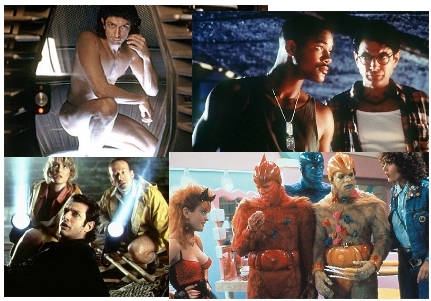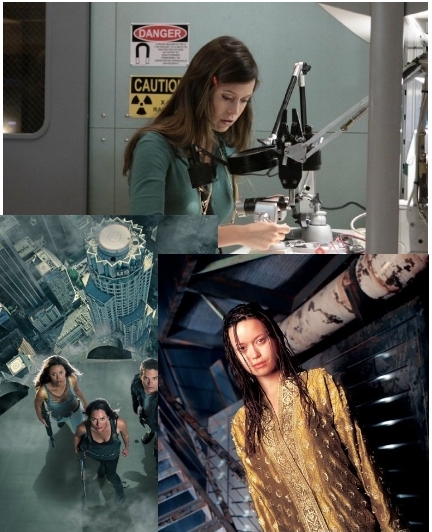There are 3 ways for a scientist to enter that bastion of decadence we call "where I'd like to be". The first is basically a dating service for Movie Makers and Scientists. Since Nov 2008, Jennifer Oullette has run the "Science and Entertainment Exchange", a National Academies of Science program that is in LA, that tries to match scientists and writers.
It turns out '80% of people in America has never met a scientist'. How sad, how sad. But Hollywood doesn't want scientists because of altruism or voyeuristic instincts. In a movie, a lot of things are "buys", i.e. 'a character can talk to dolphins', that's just a buy, you just go with that. The idea is to reduce the number of buys and have more things be accurate. So better science means fewer buys, and thus a better movie.
 | Ever notice some people play scientists a lot? |
I | Not that it's a bad thing ... |
Next is Leslie Kenna's experience in caged heat screenwriting, where screenwriters and scientists are paired up and forced to write a screenplay. This is run by the American Film Institute and, to be in it, all you have to do is apply. And be selected. And work your buns off. It can take 3 days just to write one sentence-- if that sentence is your 'logline' or summary of everything.
She gave an example for the Wizard of Oz: "After a twister transports a lone Kansas farm girl to a magical land, she sets out on a dangerous question twist to find a wizard who can send her home." Which is better than the other Oz one she cited, 'A young girl arrives in a strange land, murders a local, then sets out to kill again."
Finally, we have cancer. Cancer is always popular, in media at least. So Brooke Wang helps ensure the accuracy of cancer in television programming. Originally funded by the National Cancer Institute, it's now privately funded by NPO endowments. So the next time you see cancer on 'House', or 'Desperate Housewives' or 'As the World Turns' or 'Grey's Anatomy', thank a scientist. Err, for the accuracy, not the disease-- that's the screenwriter's fault.
So how does this all work? I'm going to go out on a limb here and suggest you listen listen to the podcast (or read its attached transcript). You'll laugh, you'll cry, you'll tell your friends.
Until next week,
Alex
Tuesdays at The Satellite Diaries and Friday at The Daytime Astronomer (twitter @skyday)





Comments